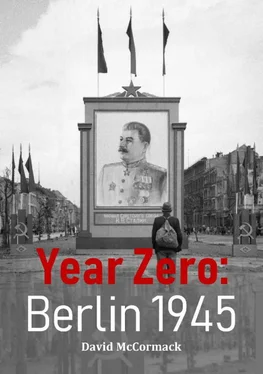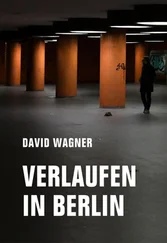As you have been informed by General Krebs, former Reich-Chancellor Goering cannot be reached. Dr Goebbels no longer lives. I, as one of those remaining alive, request you to take Berlin under your protection. My name is known. Director of the Ministry of Propaganda, Dr Fritzsche.
After reading the letter aloud, Chuikov asked Heinersdorf about the circumstances of Goebbels’ death and the whereabouts of General Krebs. The questions then turned to the inevitable matter of surrender:
Chuikov: Are you aware of our terms – that we can speak only of unconditional surrender?
Heinersdorf: Yes, we are aware of that. That is what we came to do, and we offer our help.
Chuikov: And what can you do to help your people?
Heinersdorf: Dr Fritzsche asks that he be given the opportunity to speak over the radio to the German people and army, calling on them to stop pointless bloodshed and to accept unconditional surrender.
Chuikov: Will the troops accept orders from Fritzsche?
Heinersdorf: His name is known to all Germany, and to Berlin especially.
Following a discussion on the telephone with Marshal Zhukov, Chuikov ordered Colonel Vaigachel to escort the German delegation back to their own lines. He also ordered Vaigachel to make arrangements for the proposed broadcast to the German people and army.
However, events were now proceeding apace. As the delegation was leaving, they unexpectedly came face to face with Weidling, who snarled, ‘You should have done this sooner’. Weidling was ushered into Chuikov’s presence. Without preamble, Chuikov began the interrogation:
Chuikov: You command the garrison of Berlin?
Weidling: Yes, I am the commander of 56 thPanzer Corps.
Chuikov: Where is Krebs? What did he tell you?
Weidling: I saw him yesterday in the Imperial Chancellery. I believe that he has committed suicide. To begin with he reproached me because capitulation had started yesterday, unofficially. Today an order for surrender was issued to the troops of the Corps. Krebs, Goebbels and Bormann yesterday refused the idea of surrender, but before long Krebs was himself convinced of the closeness of our encirclement and decided – in spite of Goebbels – to stop the senseless bloodshed. I repeat, I have given orders for my Corps to surrender.
Chuikov: And the whole garrison? Does your authority extend to it all?
Weidling: Yesterday evening I issued an order to continue resistance, but… later I issued another order.
General Sokolovskii: Where have Hitler and Goebbels gone?
Weidling: As far as I know, Goebbels and his family must have committed suicide. The Fuhrer did the same on 30 April. His wife…took poison.
Chuikov: Did you hear this, or see it?
Weidling: Towards evening on 30 April I was in the Imperial Chancellery. I was informed of this by Krebs, Bormann and Goebbels.
Chuikov: So this is the end of the war?
Weidling: In my opinion, to waste a single life more would be a crime, a madness.
Chuikov: Quite right… Have you served long in the army.
Weidling: Since nineteen hundred and eleven. I started in the ranks…
General Sokolovskii: You must issue an order for full surrender.
Weidling: I was not able to issue orders for surrender at all, since I had not got contact. So there may still be isolated groups in a number of places which will continue resistance. Many people do not know of the Fuhrer’s death, since Dr Goebbels forbade announcement of it.
Chuikov: We have ceased hostilities entirely, and even grounded the air force. You are not aware of the latest developments? Your troops started to surrender, and after that a delegation came here from Fritzsche with a declaration of surrender, and we stopped all action in order to make it easier for them to put this into effect.
Weidling: I shall be glad to help in getting our troops to cease hostilities… The SS want to break through to the north. My authority does not extend to them.
Chuikov: Issue an order for full surrender… So that resistance may not be kept up in even isolated sectors.
Weidling: We have no reserves of ammunition. Resistance cannot therefore go on for long.
Chuikov: We know this. Write an order for full surrender, and then your conscience will be clear.
Weidling conceded that it was a case of better late than never. Commenting that this was the second war in which he had ended up on the losing side, Weidling appeared resigned to his fate, and that of Germany as a defeated nation. He then sat down to draft the surrender order which took him only a short time to write. When it was completed, he started to read it aloud:
Weidling: On 30 April the Fuhrer ended his own life by his own hand…
Sokolovskii (interrupts Weidling): It has come to our knowledge that Doenitz has announced this to the world.
Weidling: No. Yesterday Dr Goebbels told me that only Stalin had learnt of this.
Sokolovskii: Yesterday there was a transmission from an unidentified German radio station, saying that Hitler had died a heroic death.
Not knowing how to respond to Sokolovskii’s assertion, Weidling simply handed over the completed order which read as follows:
On 30 April the Fuhrer ended his life by his own hand and thus we who swore loyalty to him are left alone. According to the Fuhrer’s orders you, the German troops, were still to fight for Berlin, in spite of the fact that ammunition had run out, and regardless of the general situation, which makes further resistance on our part senseless. My orders are: to cease resistance forthwith. Weidling, General of Artillery, former Commandant of the Berlin defence area.
The order was read by Chuikov, Sokolovskii and General Pozharski who had now joined them. According to Chuikov, the formulations in the order were quite satisfactory. However, Sokolvskii thought differently, sparking off a discussion on the exact wording of the order:
Sokolovskii (to Weidling): You need not say ‘former’, you are still Commandant.
Pozharski (to Chuikov): Should we have that formulation about swearing loyalty.
Chuikov: There is no need to alter it. It is his order.
Weidling (to Chuikov): Should it be an order, or an appeal?
Chuikov: An order.
Interpreter (to Chuikov): How many copies.
Chuikov: Twelve. No, as many as possible.
Weidling: I have a large staff. I have two Chiefs of Staff, and two more Generals who have retired but who came to me and put their services at my disposal. They can organise the surrender.
At 11.30hrs, Chuikov gave instructions for copies of the surrender order to be distributed by one of Weidling’s officers accompanied by one of his own officers. Shortly afterwards, Fritzsche arrived in person to accept the terms of unconditional surrender demanded by the Soviet command in Berlin. Fritzsche, Chuikov and Sokolovskii then proceeded to discuss the implementation of the surrender, along with security arrangements which clearly were a matter of concern for the senior Nazi official:
Sokolovskii (to Fritzsche): We have an interest in ensuring calm in Berlin. We can provide a guard for anyone who is concerned for his safety.
Fritzsche: The German police organs have broken up and fled, but they can be brought together again.
Sokolovskii: We are not interested in the police. Thy will be numbered among the prisoners of war. We are interested in the administrative officials. We will provide guards for them. They will come to no harm.
Fritzsche: I do not understand. Who would do them harm, and where? Who would dare to commit excesses?
Sokolovskii: Some of our soldiers, and the German population, may show cruelty to you in return for the actions of the Gestapo, etc.
Fritzsche: Yes, that is possible.
Sokolovskii: We have provided for everything, and made the appropriate announcements. A Commandant of Berlin has been appointed, the Soviet General Bezarin. A Komendatura has been set up for each district, and these will take all measures. Have you any other wishes?
Читать дальше












